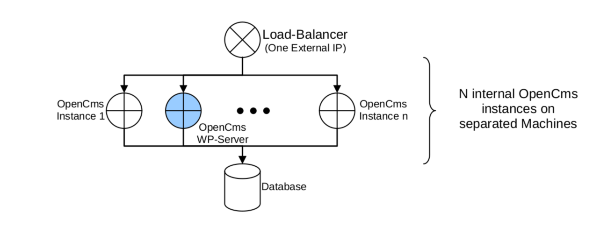The Cluster Manager is a module that allows configuring a clustered environment with several OpenCms instances installed on separated machines where all instances access the same database, and so serve the same content. This requires a load balancer in front of the cluster to distribute the request to the different OpenCms instances.New text.
The OCEE Cluster manager allows you to run multiple OpenCms servers in a cluster, and thus reduce the server load per machine. It also provides the OpenCms administrators with some tools to manage the configuration of servers in a cluster.
Please note that the database could also be a clustered environment.
There is just one limitation of the Cluster Manager module: Only one OpenCms instance can be configured to forward events to the cluster, which we will call the "active workplace server" in the following text. So if an OpenCms instance that is not the current active workplace server fails, there is nothing to do, you and your customers will not notice that. But if the current active workplace server fails, you will notice that (not your customers of course) if you try to do something on it, so you will have to choose another active workplace server, log in, and set the server as the current active workplace server, before the events are again forwarded to the cluster.
Note that while the OpenCms instances in a cluster share a database, they each have their individual search indexes and caches (e.g. Flex Cache or OCEE Accelerator cache). The main function of the cluster manager is to make sure that changes on the workplace server are communicated to the other servers, so that they can update their caches and search indexes.
